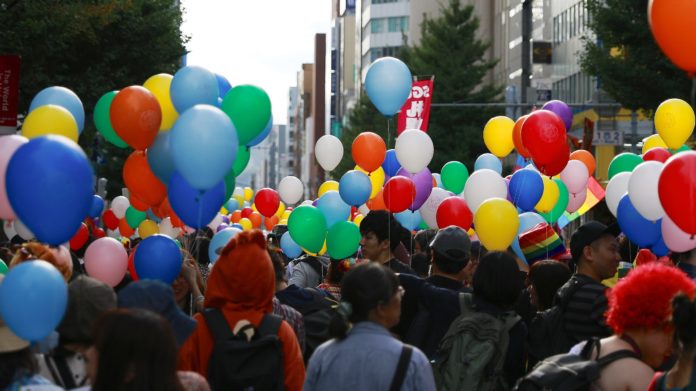
In order to change their gender marker Japanese people have had to submit to trans sterilisation via Law 111. However a recent Supreme Court ruling has found this to be unconstitutional, covering this momentous change for Japanese trans people, Mako Nakajima writes;
The landscape of LGBTQ+ rights in Japan has been a complicated one for decades, with activists combating the social and legal barriers that sexual minorities often have to face while living in the country.
In 2003, the Japanese Diet passed Law 111, otherwise known as the Special Law on Gender Identity Disorder [English], which set several prerequisites for people to be able to change their legal gender on government documents and their family register. The main clauses that drew criticism were the “genital appearance” and “sterilisation” requirements.
The largest roadblocks to legal recognition per the new law were mandatory sex reassignment surgery and surgical sterilization. This law was met with widespread opposition from activists within Japan for years, eventually being challenged by Takakito Usui, a transgender man, in 2016.
Usui and his attorney argued Article 13 [English] of the Japanese constitution, the right for all people to be respected as individuals, was violated by Law 111. The case continued for three years eventually escalating to the Supreme Court, but was eventually rejected in 2019, with the panel of four justices deciding that the law was necessary to prevent confusion among families that could arise if the distinctions based on biological sex were to change suddenly.
Despite the rejection of Usui’s case, the justices conceded that the law “undeniably restricts an individual’s freedom to not have their body violated against their will”, and added that such a matter would require “constant review” to respond to the changes in society.
On October 25, 2023, Chief Justice Saburo Tokura reissued the verdict on Usui’s case, ruling that the sterilization requirement in Law 111 was unconstitutional. In his ruling, Tokura stated that such a provision was a violation of Article 13 because it “forces people to choose between a physically invasive surgery or renouncing their gender identity”. This decision was unanimously agreed upon by all 15 justices of the Supreme Court.
Per the court’s new ruling, the sterilization requirement was declared invalid and unnecessary for legal recognition, but no verdict on the appearance requirement was made, with the decision instead being sent back to the Okayama High Court, where Usui had previously made his appeal. 3 of the 15 justices dissented, arguing that the appearance requirement was also unconstitutional and should also be reviewed by the Supreme Court.
Usui himself was disappointed by the lack of a verdict on the appearance requirement, but said he had high hopes this would be “a chance to change opinions about how appearance is the deciding factor in one’s gender”. While it’s true this was only a partial ruling, it’s still undeniably one of the largest legal victories that Japan’s transgender community has experienced since Law 111’s implementation.
For years, activists and other plaintiffs have criticized Japan’s government for failing to meet international standards on legal gender recognition. Law 111 was seen as more and more outdated as various organizations around the world, such as the WHO and APA, revised their own standards to de-stigmatize and accommodate transgender people in other countries.
Professor Naozo Kobayashi of Nagoya City University commented on this ruling, positing that the court’s decision was likely influenced by “international criticism” and the changes in Japanese society. The status of LGBTQ+ people in Japan does not exist in a vacuum. Just as domestic activists look to other groups around the world for support, the opposite is also true. With more transphobic ideology being imported into Japan recently, every step forward like this makes that more of a difference.
In the past several years, it hasn’t been uncommon for prefectural courts to make decisions on LGBTQ+ rights that make the waves internationally as signs of progress in Japan. The caveat to many of these is that they only affect the prefectures, like Nagoya and Tokyo, in which the rulings are made. What differentiates this decision is that it has nationwide implications, and could lead to similar decisions being reversed on cases regarding gay or trans rights that have been rejected in the past.
A ruling like this won’t immediately overturn all the roadblocks that make life for transgender people difficult in Japan. But it does signify potential for things to come, and it’s a crucial step in Japan catching up with other nations on this front. It brings a new sense of optimism and a clear message to those who’ve dedicated their lives to this cause: trans rights are always worth fighting for.










